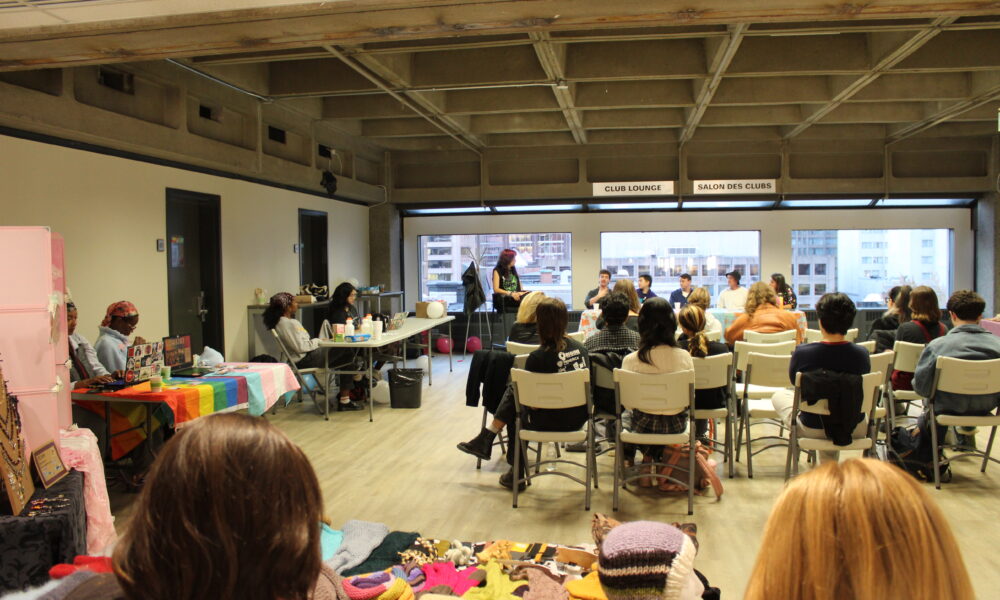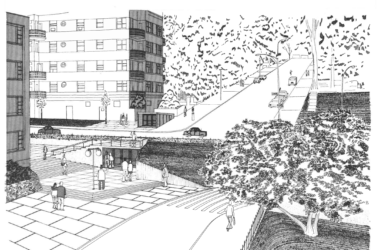On the chilly night of Oct. 8, students, activists, organizers, and vendors gathered on the fourth floor of the University Centre in celebration of Queer History Month. Queer McGill’s Market and Panel Discussion featured a variety of organizations and speakers focused on issues surrounding transgender and nonbinary communities.
The heart of the conversation highlighted the importance of creating spaces where trans, nonbinary, and gender-nonconforming individuals not only feel accepted but also see their identities reflected in queer-centric spaces. Even within queer organizations and communities, as the panellists discussed, trans and nonbinary people often have to advocate for themselves—whether seeking access to gender-affirming care or fighting to see themselves represented and reflected—in ways cisgender queer people do not. At the same time, the cultural and political rise of transphobia in Canada threatens the very fabric of these communities.
Val Munoz, a master’s student in McGill’s Department of Integrated Studies in Education, emphasized that in the wake of hateful sentiment, community-building is more important than ever.
“[In] Quebec, there’s a recent bill that was passed [restricting] gender-neutral language or pronoun-usage anymore in official documentation. It’s still a fight to be acknowledged in the first place. So, it’s super important for us to feature trans and nonbinary specific vendors and panellists for today’s event.”
Munoz refers to the recent decision of Jean-François Roberge, Minister of French for Quebec under the Coalition Avenir Québec government, to ban the use of gender-inclusive language in all official communications. This prohibits government officials from using the pronoun ‘iel’ or adding inclusive suffixes to gendered words, as in ‘étudiant.e.’
Institutional barriers to gender inclusivity exist beyond the governmental level and manifest in all corners of society, including at universities like McGill. Juno Cinq-Mars, U2 Education, and one of the organizers of the event, stressed that even though McGill has made progress in offering services to queer students, there is still a long way to go.
“Overall, right now, there’s been an increase in gender-neutral washrooms, but we need to expand on that project and make sure that’s accessible in every single building. There’s no reason that I need to be running around multiple kilometres while being disabled, just because I’m trans, to find a washroom.”
Other panellists and vendors spoke of the importance of safety in community organizing. Katya Tyutyunyk, a master’s student at McGill’s School of Architecture and member of the featured organization lowkiki, highlighted that creating queer spaces apart from party culture is one of the missions of the group.
“Our purpose, initially, was to create an alternative to nightlife and give queer [folks] a space where they can build community and meet each other without having to party and drink.”
“We mainly do a ‘third-space’ type of event where you come and hang out. We have collaging, […] we’ve done trans-centric events, we’ve done an event that was centred around braiding for Black and Indigenous People of Colour. And these are all kinds of things we want to centre with our events in terms of creating a space where people can come and become friends in the city without pressure,” Tyutyunyk added in an interview with The Tribune.
The event underscored the responsibility of allies to support queer voices and work collaboratively to ensure the proliferation of inclusive spaces. Queer History Month reminds everyone to acknowledge and celebrate the countless queer individuals and organizations who have fought against oppression and for civil rights throughout history.
Cinq-Mars continued, “Queer issues affect everyone, not just queer people. Issues with forced gender conformity affect cis people, they affect straight people, and overall, we have to break free from the binaries of gender, and the heteropatriarchy, in order to increase the quality of everyone’s lives, not just queer people’s lives.”
Interested students can follow Queer McGill on Facebook and Instagram to stay up to date on the wide range of events, services, and programs they offer to the McGill community.









